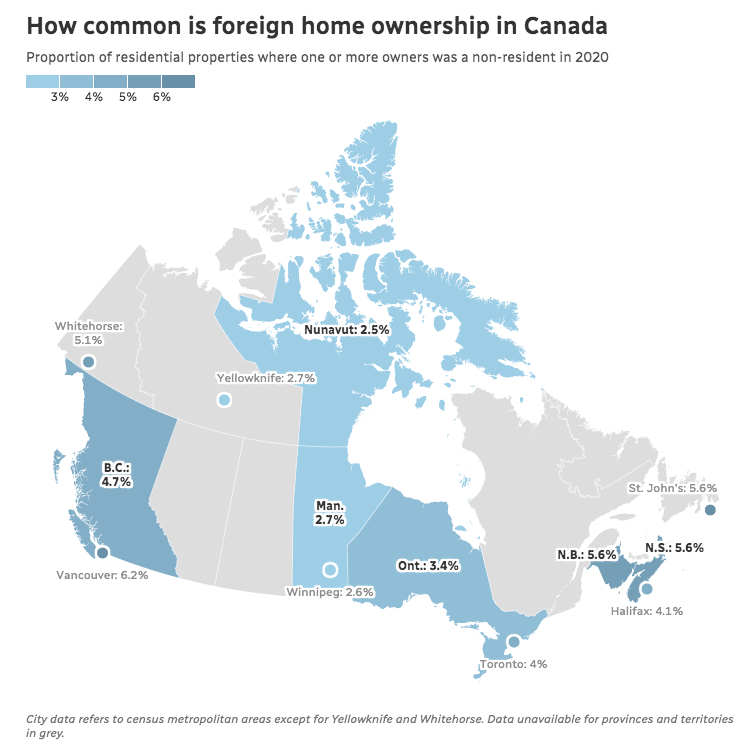Canada’s Foreign Buyers Ban: As of January 1st, 2023, Canada has banned some Foreign Buyers from purchasing property in Canada for two years.
The ban aims to help ease one of the most unaffordable housing markets in the world.
As of this summer, the average home price in Canada was C$777,200 – more than 11 times the median household income after taxes.
Some have been critical of the ban, saying it is unclear what impact it will have on Canada’s housing market.
Non-Canadian residents make up less than 3.3% of homeowners in Ontario, where national statistics indicate home prices are among the highest.
As of 1 January, the ban prohibits people who are not Canadian citizens or permanent residents from buying residential properties and imposes a C$10,000 fine on those who breach it.
In late December – 11 days before the ban came into effect – the Canadian government announced some exemptions to the regulation, including for international students who have been in the country for at least five years, refugee claimants, and people with temporary work permits.
While housing prices in Canada dipped slightly in 2022, they remain much higher than a decade ago.
Housing prices were up 48% last year compared to 2013 when the average price of a home was C$522,951.
Canada’s Foreign Buyers Ban: The Law
As of January 1, 2023, the Prohibition on the Purchase of Residential Property by Non-Canadians Act has officially come into effect.
It prohibits non-Canadians from purchasing Residential Property, directly or indirectly, for a two-year period.
Definition of “non-Canadian”
A person who is not:
- A Canadian citizen
- A permanent resident
- Registered as an Indian under the Indian Act
A corporation that is:
- Incorporated outside the laws of Canada or a province
- Not Listed on a Canadian Stock Exchange and is controlled by a person who is a non-Canadian
Definition of “Residential Property”
- A detached house or building with three (3) units or less
- A semi-detached house, rowhouse unit, residential condo, or similar premise.
- Vacant land that is zoned for residential or mixed-use

Exceptions to Canada’s Foreign Buyers Ban
The following types of purchases are exempt from the prohibition:
- Acquiring property by death, divorce, separation, or a gift
- Renting a property for the purpose of occupation by the tenant
- Transfer under terms of a trust that was created prior to January 1, 2023
- Transfer resulting from a security interest or secured right by a secured creditor
The following types of persons are exempt from the prohibition:
(excuse the legal jargon)
- An individual who is a non-Canadian and who purchases residential property with their spouse or common-law partner, if the spouse or common law-partner is not a non-Canadian
- A temporary resident within the meaning of the Immigration and Refugee Protection Act who satisfies prescribed conditions;
- A protected person within the meaning of subsection 95(2) of the Immigration and Refugee Protection Act
- A foreign national who holds a passport that contains a valid diplomatic, consular, official, or special representative acceptance
- A foreign national with valid temporary resident status, whose temporary resident visa was issued, or temporary resident status was granted by a justified exemption under section 25.2 of the Immigration and Refugee Protection Act
- A person that has made an eligible claim for refugee protection in accordance with subsection 99(3) of the Immigration and Refugee Protection Act
So under these exceptions, will fall the immigrants and foreign students coming into Canada, and we know those numbers are huge.
As per the Government of Canada resources, in 2021, over 405,000 immigrants were admitted into Canada during Covid, and out of that number just over 48% came to Ontario. That’s over 198,000 people that came into the province to reside in 2021 alone.
The projections for 2023 and 2024 are incredible.
In 2023 the projections are at 475,000 and in 2024, 500,000. Of these, 118,000 will be high-skilled and 117,000 will include families.
50% of these numbers will come to Ontario, and 90% of those will settle in Toronto and the GTA.
Now, let’s take into consideration international students. Over 1 Million international students will be welcomed to Toronto this year, with 490,000 of these students needing housing.
All of these entering Canada in the next two years will fall under the exceptions for Canada’s Foreign Buyers Ban.
Canada’s Foreign Buyers Ban: Concequences
So what happens if a non-Canadian breaks this law?
Any person found to contravene the prohibition, directly or indirectly, is guilty of an offense and liable on summary conviction to a fine of not more than $10,000.
Now some of you may be thinking, $10,000 isn’t actually that much money in the context of real estate. And you’re right.
So the government went ahead and included a provision allowing them to force the sale of any property purchased by a non-Canadian during the prohibition and stop them from receiving any profits (if any).
Canada’s Foriegn Buyers Ban: Housing Impact
So will this Foreign Buyers Ban really have an impact on housing prices in Ontario? In short, the simple answer is no.
Many real estate and housing policy experts are unconvinced that the two-year ban will have much impact on house prices — given non-resident buyers make up such a small share of the real estate market, and many will still be exempt.
This is very much a political policy, more than an economic policy. Much of the public has been convinced over the last few years that it’s foreign investors and foreign money that are driving home prices, rather than what’s actually doing it: low interest rates and very low supply.
If you’re thinking about buying, selling, or investing and want to discuss strategies, pricing, timing, or anything else, simply complete my form on this page so we can get in touch right away.
